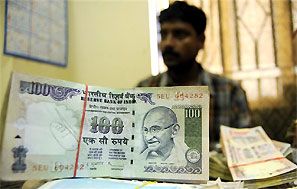While information technology companies will benefit, firms with high foreign borrowings or heavy dependence on imports will be hurt
The recent fall in the rupee has taken the equities markets by surprise, too. The rupee has depreciated by approximately 4.5 per cent in absolute terms in last two months resulting in annualised percentage drop of approximately 27 per cent. Most of the market analysts who have focussed on the inflation rates and the monetary policy have been caught off-guard by this development. The biggest worry now is that currency depreciation may spoil the show for the stock markets. The Indian economy is majorly impacted by the movement in the dollar as compared to any other international currency. Let us look for the reason why dollar has been strengthening these days.
The Indian economy is majorly impacted by the movement in the dollar as compared to any other international currency. Let us look for the reason why dollar has been strengthening these days.
The robust performance of US equities and the improvement in the labour market has made Americans more optimistic about the outlook for the US economy, thereby, spurring greater hopes for investors. The US dollar is sought after these days because the Federal Reserve is in a far better position as compared to the European Central Bank and Bank of Japan. The Federal Reserve is talking about tapering asset purchases at a time when European officials are considering more aggressive monetary easing measures.
Owing to the uncertainty prevailing in Europe and the slump in the international markets, investors prefer to stay away from countries with lower credit rating.
India has always had a trade deficit. Any upward movement in oil which is biggest import component puts pressure on rupee v/s dollar.
The depreciation in local currency value can have a different impact on stocks. It will be adverse for those who are import oriented and beneficial for the ones that export.
Let us look at some of the reasons why a falling will affect companies' profits and, hence, their stock prices.
Increase in project cost: Those companies that are dependent on imports have to pay higher price due to appreciation in foreign currency. Due to this, many companies will face an increase in project cost which can lead to problems like cash flow, profitability and so on.
Increase in borrowing cost: The companies that have borrowed in international markets have to pay higher interest cost due to increase in conversion price. Some of the companies that have heavily borrowed in the international markets by way of FCCB are badly affected even to date.
Decline in rupee is inflationary: A decline in the value of a country’s currency is essentially inflationary. As the landed costs of goods increase, it may lead to inflation. Due to increase in prices, the margins shrink resulting in lower profits and lower stock prices.
Which stocks are benefited?
Stocks which are export oriented are benefited due to the fluctuation. This is because there is higher income and profitability due to better conversion price. For instance, IT stocks benefit to a large extent if the rupee declines.
As can be seen in the table, there is an inverse correlation on movement in USD and price of gold. Similarly a stock like TCS has moved up exactly in same proportion as the USD has appreciated making it a perfect hedge against rupee depreciation. Another export oriented stock, namely HCL Tech, has in fact outperformed the rupee depreciation, perhaps on better margins.
Stocks with exposure to foreign currency borrowings such as Hindalco and Suzlon have very much underperformed on account of the rupee depreciation resulting in higher borrowing cost in rupee terms.
Impact on equities for FII
Overall a depreciating rupee is not good for the market because it has an adverse impact on most of the sectors except for export oriented entities. Foreign Institutional Investors inflows are also affected as any appreciation in stock prices will be negated by the depreciation in rupee.
For example, if they had purchased a stock at, say $1, on June 08, 2011 when $1 was equivalent to Rs 44.70. The stock had risen to Rs 57.07, that is, an appreciation of approximately 28 per cent. However, due to depreciation amount repatriated will be only $1 resulting in no gain situation.
The general perception is that until the global macroeconomic environment stabilises, the rupee may continue to be under pressure. The recent depreciation in the rupee is not good news for the domestic stock markets.
The rupee’s slide may continue due to the sharp decline in net forex inflows. Although in the short term, stocks in the Information Technology space may benefit, it may cause problem to other stocks resulting in a depressed market conditions. Putting a right investment strategy is the need of the hour. That can be done by investing in assets which act as hedge against currency movement.
The writer is a freelancer











